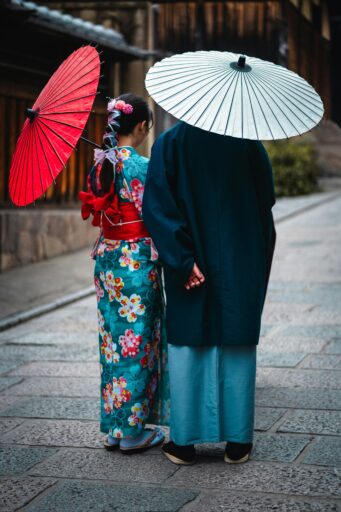Japanese citizenship by marriage is not automatic — even if you marry a Japanese national, you must still go through a structured naturalization process overseen by the Ministry of Justice.
Unlike countries that grant citizenship quickly to foreign spouses, Japan requires proof of residence, cultural integration, and in most cases, renunciation of your previous nationality.
In this article, we cover:
- What are the requirements for citizenship through marriage in Japan?
- Who is eligible for Japanese citizenship by marriage?
- How long do you have to live in Japan to apply for citizenship?
- What are the benefits of marrying a Japanese citizen?
My contact details are hello@adamfayed.com and WhatsApp +44-7393-450-837 if you have any questions.
The information in this article is for general guidance only. It does not constitute financial, legal, or tax advice, and is not a recommendation or solicitation to invest. Some facts may have changed since the time of writing.

How to get Japanese citizenship through marriage?
Unlike some countries, marriage to a Japanese citizen does not automatically grant you Japanese nationality.
The process involves:
- Applying for a spouse visa, which allows you to live and work in Japan.
- Building a record of residence and stability in Japan.
- After meeting certain residency and legal conditions, applying for naturalization with the Ministry of Justice.
In short, marriage is a starting point, but naturalization is still required.
Who is eligible for citizenship by marriage in Japan?
You may apply for Japanese citizenship by marriage if:
- You are legally married to a Japanese citizen.
- You have lived in Japan for at least three years continuously, or you have been married for three years and lived in Japan for at least one year.
- You have a stable income, good conduct, and no criminal record.
- You can demonstrate integration into Japanese society, including language ability.
What are the Japanese citizenship by marriage requirements?
The Ministry of Justice sets specific naturalization requirements, which include:
- Marriage certificate (Japanese koseki tohon, or family registry, listing the marriage)
- Residence records (juminhyo for both spouses, showing current address in Japan)
- Proof of continuous residence (passport copies, entry/exit records)
- Tax certificates (shotoku shomeisho and nozei shomeisho for the past several years, covering both applicant and Japanese spouse)
- Income and employment documents (employment certificate, pay slips, or business registration if self-employed)
- Identity documents (passport, residence card, photos)
- Japanese language ability proof (may be demonstrated through an interview or school transcripts rather than a formal test)
- Renunciation commitment (since Japan does not allow dual citizenship, you must show readiness to renounce your prior nationality once naturalization is approved)
Additional items may be requested, such as family background statements or letters explaining your integration into Japanese society.
How soon after marriage can you get citizenship in Japan?
In practice, if you marry and move to Japan immediately, the total timeline is often closer to 3–5 years, factoring in both the residency requirement and the lengthy Ministry of Justice review period.
The fastest route to Japanese citizenship through marriage takes at least 1–3 years of residence plus an additional 8–12 months for application processing.
To qualify for the one-year residency rule, you must have been married to a Japanese citizen for at least three years; otherwise, the requirement is usually three consecutive years of living in Japan while married.
How much does it cost to become a Japanese citizen by marriage?
The Ministry of Justice charges no application fee for naturalization, but related expenses add up:
- Official documents: ¥300–¥1,000 per copy
- Translations: ¥2,000–¥10,000 per document
- Legal assistance: ¥100,000–¥200,000 if using a scrivener
- Miscellaneous: about ¥10,000–¥30,000 for copies, travel, and notarizations
Overall, expect ¥150,000–¥250,000 (USD 1,000–1,700) if you use professional help, though handling the process yourself can be cheaper.
Unlike costly citizenship-by-investment programs, Japan’s path is financially accessible but time-intensive.
Can I get permanent residency in Japan if I marry a Japanese?
Yes. Spouses of Japanese nationals can apply for permanent residency after as little as 3 years of marriage and residence in Japan, or even 1 year in some cases if the marriage is longer.
Permanent residency is often easier to obtain than citizenship.
Permanent residency allows you to live indefinitely in Japan without giving up your existing citizenship.
Does Japan allow dual citizenship?
No. Japan requires adults to choose one nationality. If you acquire Japanese citizenship, you must formally renounce your previous citizenship.
Children born with dual nationality are allowed to hold both until the age of 20–22, after which they must declare one nationality.
How strong is a Japan passport?
Japan has one of the world’s most powerful passports, providing its holders extensive visa-free access and global mobility.
According to major rankings:
- Henley Passport Index: Japan ranks 3rd, offering visa-free or visa-on-arrival access to 189 destinations.
- Nomad Passport Index: Japan is 37th with a score of 102, measuring visa access, taxation, and personal freedom.
- Arton Capital Passport Index: Japan ranks 4th with a Mobility Score of 173.
What are the benefits of being a Japanese citizen?

Citizenship in Japan offers several advantages:
- Full legal rights – Including voting, eligibility for public office, and unrestricted work opportunities.
- World-class passport – Japan consistently ranks among the strongest passports globally, with visa-free or visa-on-arrival access to 190+ countries.
- No visa renewals – Citizenship ends the need for spouse or work visa renewals, providing permanent security of residence.
- Healthcare, education, and pensions – Citizens gain full access to Japan’s social security system, national healthcare, and public education benefits.
- Access to restricted opportunities – Certain public sector jobs, government housing programs, and ownership of agricultural land are limited to citizens.
- Education benefits for children – Citizens’ children receive broader tuition subsidies and can access free public high school programs.
- Inheritance and asset security – Japanese nationals face fewer legal barriers in intergenerational wealth transfer and property inheritance.
- Cultural belonging – Citizenship offers deeper social acceptance in a country where naturalization is rare, reducing everyday challenges in housing, finance, and community life.
- Community participation – Legal nationality allows fuller integration into local governance, festivals, and traditional associations that often expect Japanese citizenship.
What are the disadvantages of citizenship in Japan?
The biggest disadvantages of Japanese citizenship include:
- No dual citizenship for adults – Naturalized citizens must renounce their previous nationality, limiting global flexibility.
- Strict cultural and linguistic expectations – Japan is still a highly homogeneous society; full integration often requires fluency in Japanese and adherence to social norms.
- Permanent tax obligations – Once naturalized, you’re fully subject to Japan’s tax regime, including worldwide income taxation if you reside in Japan.
- Difficult renunciation process – Unlike some countries, giving up Japanese nationality later can be complex and rarely granted once acquired.
- National obligations – Citizens must enroll in pension and health insurance systems and may face restrictions if they fail to contribute.
- Geopolitical limitations – Japanese citizens cannot easily work or reside long-term in certain countries (like the EU) without visas, unlike EU or Commonwealth nationals who enjoy free movement.
So overall, the biggest issue is the loss of flexibility, both legally (renouncing your other passport) and practically (adjusting to Japan’s expectations of conformity).
Why is it hard to get citizenship in Japan?
Japan maintains one of the hardest naturalization systems in the world. The government emphasizes cultural assimilation, strong moral character, and long-term residence.
Unlike other countries where marriage shortens the path dramatically, in Japan the process is thorough and often lengthy to protect the integrity of nationality.
What is the easiest way to get Japanese citizenship?
For most foreigners, the easiest way is through marriage to a Japanese national combined with long-term residence.
This reduces the required residency period significantly compared to naturalization without a Japanese spouse.
However, it still requires language skills, financial stability, and renunciation of your original nationality.
Conclusion
Gaining citizenship by marriage in Japan is possible but far from automatic.
While marriage shortens the naturalization period, applicants must still meet strict requirements and give up dual nationality.
For many expats, permanent residency may be a more practical alternative, offering long-term stability without the need to renounce existing citizenship.
FAQs
What happens if a foreigner gives birth in Japan?
A child born in Japan to foreign parents does not automatically get Japanese citizenship.
Citizenship is primarily determined by parentage: if at least one parent is Japanese, the child is a Japanese national at birth.
In rare cases, a child born stateless in Japan may acquire nationality to prevent statelessness.
Can I work in Japan if I marry a Japanese?
Yes. A spouse visa allows you to live and work freely in Japan. You are not restricted to a specific employer or industry.
What is the biggest problem facing Japan?
Japan’s major challenges include an aging population and shrinking workforce.
This demographic shift has broad impacts on the economy, pensions, and immigration policy, all of which affect long-term residents and new citizens.
Pained by financial indecision?

Adam is an internationally recognised author on financial matters with over 830million answer views on Quora, a widely sold book on Amazon, and a contributor on Forbes.



